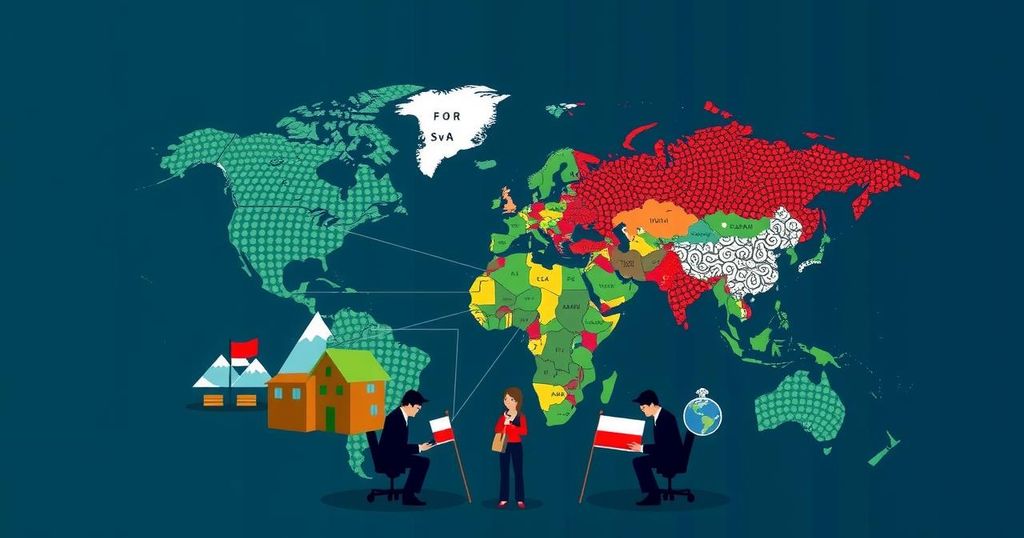Climate change
Global news
ACHIM STEINER, ASIA, AZERBAIJAN, BAKU, CLIMATE CHANGE, ELSAIM, ENERGY INFRASTRUCTURE, EUROPE, GAZA STRIP, HAMAS, INTERNATIONAL RELATIONS, MOHAMMED USROF, NISREEN ELSAIM, PETER DEJONG, UKRAINE, UN, UNITED NATIONS, UNITED NATIONS DEVELOPMENT PROGRAMME, WAR
Fatima Khan
0 Comments
Armed Conflicts Complicate Climate Negotiations at COP29 U.N. Summit
The ongoing COP29 U.N. Climate Summit in Baku emphasizes the challenges posed by global conflicts, such as those in Gaza and Ukraine, to climate negotiations and funding. With activists like Nisreen Elsaim sharing personal stories of crisis and displacement due to war and climate, the summit seeks substantial financial commitments from wealthier nations to aid developing countries in adapting to climate change. However, the diversion of resources to military efforts complicates these discussions.
At the COP29 U.N. Climate Summit in Baku, Azerbaijan, the intersection of armed conflict and climate change has emerged as a pressing issue for negotiators and activists alike. Climate activist Nisreen Elsaim’s personal experiences during the civil war in Sudan underline the need for a significant global focus on climate adaptation efforts. The ongoing wars in Gaza and Ukraine, compounded by the challenges they pose to funding and cooperation, divert vital resources from addressing climate crises, thereby complicating negotiations at the summit. Moreover, the summit’s chief objective revolves around determining financial contributions from wealthier nations towards developing countries facing climate vulnerabilities. Global leaders, activists, and experts have expressed concerns that conflicts not only overshadow climate discussions but also drain resources away from crucial climate initiatives. Many believe it is imperative to rekindle faith in collaborative efforts to save the planet and provide necessary support to nations adversely affected by climate change. The devastation from the Israel-Gaza conflict notably impacts Gaza’s environmental progress, while the war in Ukraine significantly contributes to global greenhouse gas emissions. Prominent figures, such as Achim Steiner of the United Nations Development Programme, have highlighted the misallocation of funds, with billions directed towards warfare instead of pressing climate action, education, and poverty alleviation efforts. The protests in Baku spotlight calls for more responsible financial commitments, particularly from nations supporting Israel. As the international community grapples with the recent geopolitical tensions, some experts maintain that resolution of these conflicts and a fundamental shift in military spending towards climate action would empower developing nations to respond more effectively to climate challenges. Despite these hurdles, U.N. officials stress the urgency of concrete actions at COP29 to mitigate forthcoming climate-related disasters, emphasizing that maintaining the status quo is not an option. Ultimately, the Baku summit illustrates the challenging landscape of climate negotiations amidst global conflicts, underscoring the critical need for cooperation and resource allocation to address climate change effectively, while also recognizing the complexities presented by ongoing wars.
The ongoing U.N. climate talks at COP29 in Baku focus on the urgent need for financial commitments from wealthier nations to support developing countries in coping with climate change. War and conflict, particularly in places like Sudan, Gaza, and Ukraine, have been identified as significant barriers to effective negotiation and cooperation in the fight against climate change. These conflicts not only detract from climate discussions but also deplete resources that could be directed toward climate action and adaptation efforts, compounding the challenges faced by vulnerable nations.
In conclusion, the COP29 U.N. Climate Summit has highlighted the intricate relationship between armed conflicts and climate change negotiations. As wars divert financial resources and focus away from crucial climate issues, finding a global consensus becomes increasingly difficult. The summit serves as a crucial platform for addressing these interconnected crises and emphasizes the need for unified action and investment to combat climate change and support vulnerable nations. Effective cooperation is essential to overcome geopolitical tensions and secure a sustainable future.
Original Source: apnews.com




Post Comment